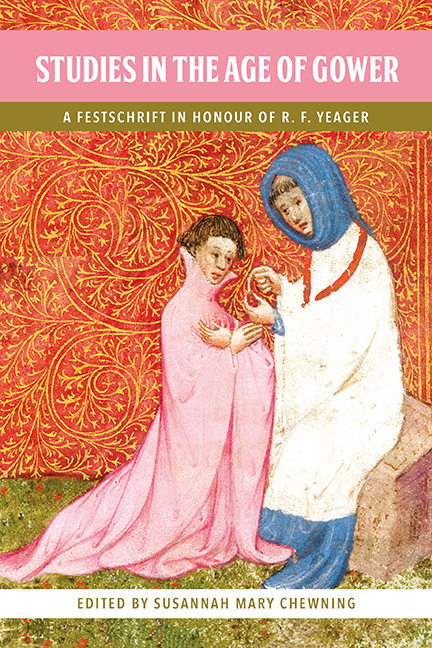Book contents
- Frontmatter
- Contents
- List of Illustrations
- Notes on Contributors
- Acknowledgements
- List of Abbreviations
- Introduction
- Part I Text
- Part II Gender
- Part III Time
- Part IV Spirit
- Part V Intersections
- A Personal Tribute to R.F. Yeager
- Bibliography of R.F. Yeager’s Writings
- General Bibliography
- Index
- Miscellaneous Endmatter
2 - The Sutherland Fragment of Gower’s Confessio Amantis
Published online by Cambridge University Press: 28 April 2020
- Frontmatter
- Contents
- List of Illustrations
- Notes on Contributors
- Acknowledgements
- List of Abbreviations
- Introduction
- Part I Text
- Part II Gender
- Part III Time
- Part IV Spirit
- Part V Intersections
- A Personal Tribute to R.F. Yeager
- Bibliography of R.F. Yeager’s Writings
- General Bibliography
- Index
- Miscellaneous Endmatter
Summary
THIS ESSAY IS AN attempt to find whether there is more to be said about the “Sutherland fragment,” one of the few remaining unanswered questions concerning the provenance of the manuscripts of Gower's Confessio Amantis. The fragment is known from a photocopy of a single manuscript leaf, recto and verso, in the Huntington Library. The photocopy of the leaf was not included in the collection of manuscripts that was purchased by Henry Huntington in 1917 from the library of the Duke of Sutherland, probably then located in Bridgewater House in London. The leaf was, however, listed in the catalogue of the collection, which itself was sent with the manuscripts to the Huntington. In the 1960s, knowledge of the missing leaf encouraged the Huntington to ask about it and if possible for a photocopy of it, in order to complete their collection of the Sutherland manuscripts. A photocopy was duly sent and is now among the fragments listed in the Catalogue of the Huntington Library. That is the extent of knowledge of the fragment. What it consists of, what manuscript it is possibly missing from, why it was not sent with the original collection of manuscripts, where the original leaf is now, and what part it may have played in recent sales activity, are all possible avenues that this essay will try to explore.
For some years now, I have been engaged in the preparation of a Descriptive Catalogue of the Manuscripts of Gower's Confessio Amantis. Originally, in the 1980s, I had two collaborators: the late Jeremy Griffiths, a doctoral student with Malcolm Parkes in Oxford, and Kate Harris, a doctoral student with me at York. The former took a leading role in the original planning, including the template for the descriptions, a specimen description, and valuable notes on individual manuscripts, but he died in 1997, having long given up his interest in the work. Kate Harris completed a number of descriptions; her 1993 thesis remains invaluable in providing exact and detailed accounts of ownership and provenance for all manuscripts and a comprehensive record of all marginal comments on the text by its readers.
I have continued to work on the Gower manuscripts, but I am not primarily a codicologist and alone I made slow progress.
- Type
- Chapter
- Information
- Studies in the Age of GowerA Festschrift in Honour of Robert F. Yeager, pp. 21 - 34Publisher: Boydell & BrewerPrint publication year: 2020



